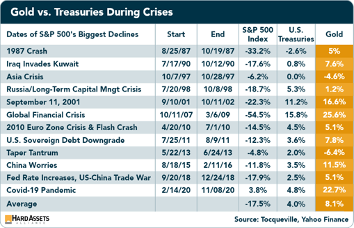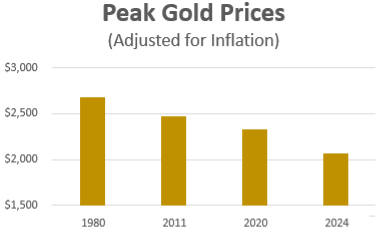I’m not a gold bug.
Sure, I have some gold coins that my kids will inherit someday.
And yes, once in a while, the yellow metal shoots higher.
But most years, gold does very little.
I’m in the same boat as billionaire Warren Buffett.
He’s come out against investing in gold, noting that it’s a poor investment. It doesn’t grow or throw off cash flow like owning shares of a great company.
As Buffett puts it:
The idea of digging something up out of the ground, you know, in South Africa or someplace and then transporting it to the United States and putting into the ground, you know, in the Federal Reserve of New York, does not strike me as a terrific asset.
But I have a confession to make…
I’m buying a little more gold this week, even as it remains near its all-time high of $2,135, set back on December 4, 2023.
Why?
A Storm is Brewing
While I always like to focus on the positive, I’m also a realist.
Sadly, an overview of the world indicates that global tensions are getting worse, not better.
Just consider…
- It’s been two years since Russia invaded Ukraine, with no end in sight.
- Last October, Hamas attacked Israel. Israel is still trying to negotiate for the release of hostages.
- In December, the rise of piracy in the Red Sea led to more supply chain disruptions. Now, 40% of the world’s supply of oil is being exported on a longer supply route…
And in just the past week, a drone attack killed three U.S. service members and injured more than 25 at a base in Jordan.
Unfortunately, we seem to be inching towards more global violence, not less.
Domestically, we have a rapidly growing federal debt, an economy feeling the stress of higher interest rates — and we’re bracing for a stressful election year.
However, gold tends to do well during times of crisis.
In the past 40 years, gold has performed well during several crises, from the 1987 Crash to the COVID-19 pandemic.
In 11 of the 12 crises, gold outperformed stocks.
In 9 of the 12 crises, gold outperformed U.S. Treasurys.
If another crisis strikes, gold will very likely outperform once again.
I don’t know what will happen with today’s geopolitical events, or what will unfold domestically.
However, it’s clear that in times of uncertainty, gold is still the go-to safe haven asset, even compared to Treasury bonds.
That’s why I’m buying a little more gold this week (I’ll show you the unique way I’m doing it in a moment).
But that’s not the only reason gold is catching my eye right now…
We Still Have 30% to Go to Reach Previous Highs
At $2,070 per ounce, gold is near its all-time high price of $2,135, set just two months ago.
But it’s important to adjust for inflation.
Just check out this chart, which looks at the price of gold adjusted for inflation:
Gold’s recent price is still well under the $2,600 per ounce that gold hit in 1980, when adjusted for inflation.
That $600 difference works out to a discount of about 30%.
Of course, the way the government measures inflation has changed over the past few decades. Many measurement changes have reduced the total impact of inflation.
That’s why gold would still likely need to rise more than 30% to truly reach a new all-time high.
If there’s another monetary crisis, which we tend to see every few years, gold’s price could move higher — and stay there.
And this time, it may make new all-time highs in real terms, not inflation-adjusted ones.
$3,000 an ounce is not out of the question.
Start Buying Insurance Before the Storm
As we’ve seen, gold isn’t a favored asset by the market right now.
But it’s cheap relative to where it should be adjusted for inflation. And it’s in a long-term uptrend. Plus, any catalyst that could cause gold prices to soar from here may mean a big move higher for the metal.
While I don’t know when exactly that will happen, gold’s long history shows that it’s a great form of portfolio insurance.
Gold can rally when the economy is dire … or it can move higher even when the economy is humming along, like it did in the early 2000s.
That’s why I’m starting to put a small amount of cash into gold today. It’s just a hedge against a number of potential dangers out there. Most may not materialize.
But you can’t buy hurricane insurance when a named storm is heading your way. You need to buy it when the skies are bright.
I know many members of our Banyan Hill community love gold and gold-related investments.
You may be one of them.
That’s why I’m always looking for ways to provide access to gold (and other precious metals) at the best price possible.
If you buy gold online, you may get taken for a ride. Between high credit card fees, or overpaying for a “numismatic” coin, there are plenty of frauds out there.
And the local coin shop seems to have gone the way of Sears.
Fortunately for us, there’s the Hard Assets Alliance (HAA).
My friends and colleagues have bought gold with them for years, and I just opened an account with them as well. It only took me about five minutes.
At the HAA, you simply set up an account, and you can start buying physical gold at a lower cost than at a physical store.
Plus, the HAA has an online marketplace, making it easy to get top-dollar returns, should you ever decide to sell your gold.
The Hard Assets Alliance will keep your bullion holdings in one of their five non-bank vaults of your choice. So it’s perfect for adding to your bullion holdings without making your home a target.
Or, you can always take delivery of your purchases.
If you are not ready to invest in gold yet, I still encourage you to check out the HAA’s free report: “How Gold Has Protected Portfolios for the Past 50 Years.”
After reading the report, I was convinced to add a little more gold to my portfolio.
And I’ll likely do so every year.
If you don’t own gold yet, as an insurance, now is a great time.
The sky is blue today … but there are storm clouds.
That’s why I’m buying gold now. Again, it only took me about five minutes to set up my account and buy some gold.
Click here to see how simple it is.

Aaron James
CEO, Banyan Hill, Money & Markets













